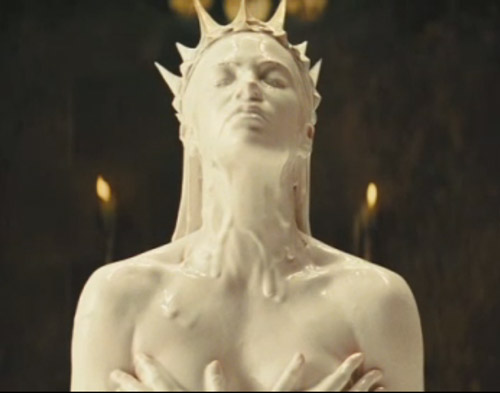
So here's an annoying pop culture cliche I've recently become aware of: the Older Woman as Vampire.
Obviously this is something that goes back to Snow White and similar myths, but it's something which I notice modern Hollywood has had no problem embracing recently. Including in the two recent Snow White adaptations. The place where I first noticed it, though, was (God help me) the Halle Berry Catwoman movie. In my defense, I haven't watched this all the way through, because it was pretty much unwatchable. But I saw enough to register that Sharon Stone's villain was apparently drawing some kind of superpower (stone skin? WTF?) from the cosmetic products she was trying to sell, which were also apparently going to mutate everyone who used them, or some such nonsense. It was clearly meant as an oh-so-satirical takedown of the beauty industry and how desperate some women are to hold onto their looks and blah blah blah.
It popped up again in Stardust, with Michelle Pfeiffer as the evil aged witch who wanted to cut out Claire Danes' heart to restore her youth (and her sisters'), and then, of course, in Mirror Mirror and Snow White and the Huntsman. There are other, similar examples, and echoes of it that don't follow the trope exactly, but the gist of it is: older woman who resorts to horrific, unnatural means to keep her looks, which puts her at odds with a younger, naturally pretty girl. The former is the villain, the latter is the hero.
Like, for instance, the "Magical Negro", this is a trope that might not actually be so bad if it didn't keep popping up over and over again, to the point of cliche. I mean, vanity is a bad thing, and people have indeed resorted to unpleasant means throughout history to stave off their own mortality. Obviously heart-eating is to be frowned on. But the problem here is where the dart of empathy is aimed: always at the young. The cumulative effect is to value young and "naturally" pretty girls over older women, whose looks are fading and who, thus, have less value in their own eyes...and the people telling the stories don't do much to suggest that they disagree, frankly.
I don't think I'm breaking any radical new ground here; I'm sure any feminists reading this are thinking "Wow, such dazzling insight, Adam! Now do you have any thoughts in re: the wetness of water?" But I do think it's worth commenting on how much Hollywood seems to exaggerate this effect. There's a pretty clear hierarchy at work here: if you're a young, hot starlet, you get to play the heroine; if you've been able to drink for a decade, it's time to start relegating yourself to villainous roles. Yes, yes, I know, twas ever thus, but it seems like there's a renewed meanness to it of late, particularly the Sharon Stone bit. All of these women are still gorgeous, particularly Theron, who isn't even fucking 40 yet, but here they are playing decaying hags, and worse, evil decaying hags who only exist to make life hard for some vapid pretty girl.
"Yes, Adam, and FIRE HOT," chant the feminists.
I know, I know. And I am used to women being valued only for their looks in the movies. But even in this superficial context, can't we at least get some movie producers capable of recognizing female beauty in someone over 30? I mean, it's not rocket science. You don't have to use some kind of formula. Yet it kind of seems like that's what's being used to determine what makes a woman "hot", as opposed to, y'know, looking.
And the end result is that not only are women being treated as if only the young ones matter, but women are written as if they themselves believe it. At the end of the day, I think this is one of the more inherently pernicious concepts in storytelling, far more than simple sexualization. There's no inherent reason a sexualized woman in a movie can't be an interesting, well-fleshed out character (I mean, they usually aren't, but there's no reason they can't be). But relying on the "evil queen" who's jealous of a younger woman--no matter how subtly it's played--automatically reduces women to the status of objects. It'd be nice if more people in the media paid attention to what they're saying with their stories.
No comments:
Post a Comment